BIOGRAPHY OF HEMANT KUMAR
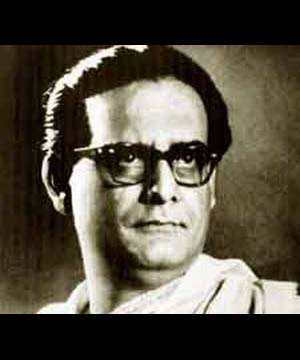
Hemant Kumar (a.k.a. Hemanta Mukherjee) was a singer, composer, and producer in the Hindi and Bengali film industry. He is most known for his Bollywood songs from the 1950's and 1960's. In his career, he recorded approximately 2000 songs.
Hemant Kumar was born Hemanta Kumar Mukherjee on June 16, 1920 in Benares (Varanasi). He had three brothers and one sister. Although he was born in Benares, his family originally hailed from Baharu in West Bengal. When he was young, his family shifted to Calcutta. There he grew up and attended Mitra Institution school of Bhawanipore. After he graduated from Intermediate, he attended Jadavpur University and began studying engineering.
Hemant Kumar's interest in music began early. He sang his first song in All India Radio in 1933. He was only 13 at the time.
However it was never clear that Hemant Kumar would become a singer. His original training was in engineering, but he dropped out of the University to pursue other paths. Initially he tried his hand at writing; he even managed to have a short story published in a major Bengali magazine. But after a while it became clear that his calling was music.
Hemant Kumar had a reasonable degree of formal training in music. He had several teachers. The major portion of his training seems to have been under Sailesh Duttagupta. He also studied under Phani Banerjee, and received his training in Rabindra Sangeet under Anadi Dastidar. Later he was a disciple of the great Faiyaz Khan. Unfortunately this last training did not last very long, it ended with the death of Faiyaz Khan in 1950.
It was in 1937 that he recorded his first disk. The names of the songs were Janite Jadi Go Tumi and Balo Go Balo More. The lyrics to these songs were written by Naresh Bhattacharya and the tune and arrangement was by Sailesh Dattagupta. This was recorded under the Columbia label. Thereafter he had a sustained output of non-film songs from the Gramophone Company of India up until 1984.
His career as a film playback singer began with the Bengali film "Nemai Sanyas"; this was released in 1941. After that he did playback for a number of other Bengali films.
The Bengali film industry was good training ground, but for him to attain a wider audience, he had to work in the Hindi film industry. He was first able to sing his first Hindi film song in "Irada" which was released in 1944. This was under Pt. Amarnath's music direction.
But Hemant wanted to show that he could do more than just sing. He wished to show his abilities as a music director. He was first able to do this in the Bengali film "Abhiyatri" in 1947. These were all very fine achievements, but he was just not able to attain commercial success.
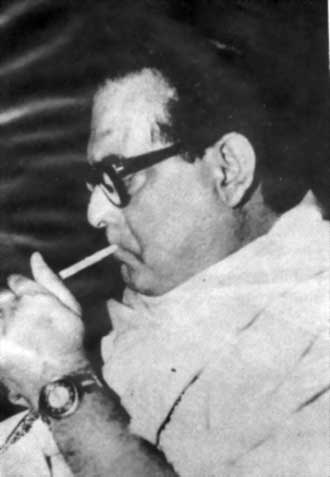
Hemant Kumar relaxes with a cigarette
This period of life was marked by a fairly normal personal life. In 1945 he married Bela Mukherjee, who was also a Bengali singer. Together they had two children, one boy named Jayant and one girl named Ranu. (It is interesting to note the the son Jayant married the 1970's film actress Moushmi Chatterjee).
The mid 1940s was a tumultuous period in Indian history and Hemant felt obliged to use his art for social and political improvement of the people. The waning days of the British Raj made the problems of imperialism very evident, and numerous social injustice cried out for some resolution. When these problems did not go away after Independence, many people felt they could no longer remain quiet. In this environment, it is no surprise that Hemant Kumar joined Indian People's Theatre Association (IPTA).
The purpose of the IPTA was to create works of art that would raise the political awareness of the common man. Plays, music, and other dramatic works were created with the aim of focusing on the social and political iniquities of the day (i.e., no dancing around trees;-) The IPTA was administered by the Communist Party of India, but not all of the participants were members of the party.
Hemant Kumar's time in the IPTA may not have done much to advance his career economically, but it was not without its benefits. First it gave Hemant Kumar the satisfaction of standing up for his beliefs. It also produced some interesting work; especially notable was his collaboration with Salil Chowdhury. In 1948 he sang an epic 6 min. song (We must not forget that in those days this occupied both sides of a 78 recording). This song was entitled Ganyer Badhu. It is said that when this song was released, Salil was not present because he was hiding from police. The success of this song paved the way for a number of other collaborations with Salil Chowdhury in the future.
Other music directors also began to take note of his abilities. In the late 1940's Hemant started to compose music for a director named Hemen Gupta. This association would produce life changing results.
This association with Hemen Gupta led Hemant Kumar to Bombay in 1951. Sometime earlier Hemen Gupta moved to Bombay to work in the growing and lucrative Hindi film industry which was developing there. Hemen liked Hemant Kumar's music so he called him to Bombay to be the music director for his first Hindi Film. This was "Anand Math" (1952) and was released under the Filmstan banner. This movie may not be considered a great hit, but it performed well enough for the Hemant Kumar / Hemen Gupta collaboration to produce several more films together.
Hemant Kumar's fortunes were about to change. He had been working very hard in the film industry for many years, yet popular acclaim was slow in coming. It was SD Burman who gave him his break for the film "Jaal" (1952). The song from this film Yeh Raat, Yeh Chaandni Phir Kahan, became a big hit, and cemented his position as a major playback singer.
Hemant began to work as a music director. He composed the music for several films, but it "Nagin" (1954) that catapulted him into national recognition as a music director. Even today the "hook" from the song, Man Doley Mera Tan Doley has become an icon that is permanently associated with snake charmers in the Indian mind. After the success of "Nagin" he went on to be the music director for numerous films including "Jagriti" (1954), "Bees Saal Baad" (1962), and "Khamoshi" (1969).
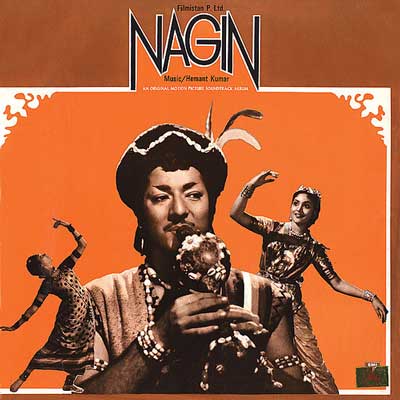
Nagin
In the 1950's, Hemant Kumaar had a varied artistic life. In Bengal he was known as a major exponent of Rabindra Sangeet. In Bombay he now had two occupations. He was known by many as a successful playback singer, and to others he was a music director. However that was not enough for him; he also ventured in as a film producer. He established a film company by the name of Hemata-Bela whose first production was the Bengali "Neel Akshar Neechay" (1959). This film company was later renamed as Geetanjali Productions; under this banner, films such as "Bees Saal Baad", and "Khamoshi", were released.
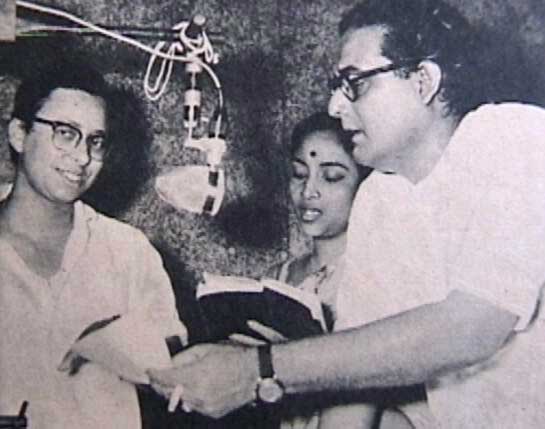
RD Burman, Geeta Dutta, and Hemant Kumar
Recognition came his way in the 50's and 60's. In 1955 he won the "Filmfare Award for the Best Music Director". This was for his film "Nagin" (1954). He won the "Presidents Gold Medal" for his film "Neel Aksher Neechay" (1959). He also received many other awards.
The film world is known for its ego clashes and conflicts; Hemant Kumar was no exception. There was a much publicised falling out that he had with Salil Chowdhury. There was a time when their professional collaboration was very close. Salil Chowdhury once said, "If God ever decided to sing, he would do so in the voice of Hemant Kumar." But things turned sour. According to a published obituary that Salil Chowdhury wrote on how other people had managed to churn up problems between them:
"They went to Hemanta-da and complained "Salil Chowdhury is saying - 'Hemanta Mukherjee would not have been popular if he had not sung my songs'". And the very same people came to me saying "Hemanta-da says - 'If I had not sung Salil's songs who would have know him today?'"
The result of such games was very predictable. For some years they refused to work with each other. Eventually there was a reconciliation, but by that time, both Hemant and Salil were past their productive prime.
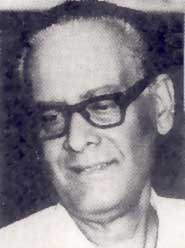
Hemant Kumar in later years
Hemant Kumar was very active throughout the 1960s, but ultimately things must come to an end. In the 1970s, his output declined considerably. His production company Geetanjali had accrued 14 lakhs of debts which could not be paid. His films were box office flops. Popular tastes were changing but Hemant Kumar was unable to keep up with these changes. Burdened by these failures, Hemant Kumar left Bombay and returned to Calcutta.
In 1980's health problems began to take their toll. In 1980 he had a heart attack. Although he recovered this impacted his abilities.
His last concert was in September of 1989. He went to Bangladesh to receive the Michael Madhusudhan Award. There he gave a performance in Dhaka. Upon his return he had a severe heart attack and died on September 26, 1989.
Although Hemant Kumar died long ago, there are continually re-releases of his old material. Sometimes these are mere repackaging of his older works and at other times they are remixes. Today, several decades on, he is fondly remembered for giving us some of the most memorable songs ever to come out of Bollywood.
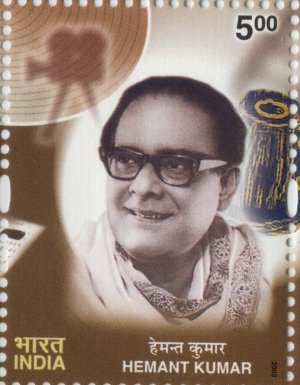
Hemant Kumar Stamp
Selected Video
© 1998 - 2021 David and Chandrakantha Courtney
For comments, corrections, and suggestions, kindly contact David Courtney at david@chandrakantha.com
